Heroic defense of Petropavlovsk. Part of 2
18 (30) August 1854, the Anglo-French squadron entered Avacha Bay and fired several shots, but soon ceased shooting. Russian batteries also made several shots. A decisive attack was waited the next day, but it did not follow. The Russian defenders of Petropavlovsk did not know then that an unforeseen event caused the enemy command to postpone the attack.
The United Squadron was led by Rear Admiral David Price, an Englishman. It was an experienced commander who took part in the first battle back in 1801 (the battle of Copenhagen between English and Danish fleets) and has come a long way from young to the rear admiral and commander of the Pacific squadron. Price personally went on the ship "Virago" to inspect the lip and Russian fortifications. According to the opinions of others, the inspection made a depressing impression on the admiral. Price was already oppressed by missing the Aurora, and his grief increased when he found out on the Sandwich Islands that the allied squadron had also blown the Dvina. Now, seeing two Russian ships in the port of Peter and Paul in full combat readiness, Price was very worried, realizing the danger of the impending attack. In addition, it became apparent that the Russian port was armed and protected much better than expected.
On the evening of August 18, a military council met under the chairmanship of Price. The disposition was worked out the next day. According to the original plan, the Allies wanted to destroy with battery fire batteries No. 1 and No. 4, then enter the harbor and crush the resistance of the battery No. 2, Aurora and Dvina. After that, they planned to send a landing party, which, with the support of shipfire, was to capture the city.
19 (31) August 1854, in the morning, the ships of the Allied squadron began to occupy the places assigned to them, but suddenly the movement stopped and the ships returned to their places at the anchorage at the entrance to Avacha Bay. As it turned out on the night of 18 on August 19, Admiral Price was killed under mysterious circumstances. The subsequent failure of the Allied squadron and its retreat made the view that the British admiral committed suicide a convenient point of view. Allegedly, he was worried, fearing for the outcome of the operation and shot himself. However, this version was inconclusive already at that time. The Governor-General of Eastern Siberia, Nikolai Muravyov, in a letter to the General-Admiral of the Russian fleet, Grand Duke Konstantin Nikolayevich, noted that the British admiral would not have killed himself before the battle, which he hoped to win. Price could not shoot himself and "by chance with his gun", since there was no need to take him in hand while on the frigate per mile from the Russian positions. And it is doubtful that Price was “frightened” by the assault on Petropavlovsk. It was a military commander, who often looked into the face of death. He was noted as a skilled and brave officer who was injured in battles more than once, was captured, participated in boarding and hand-to-hand combat. Such a person would prefer to fall in battle if he could not complete the task. Therefore, there is a version that the British admiral was killed, and the crew reported suicide, so as not to cause controversy. The reason for the murder is covered in darkness. The mysterious death of Price became a kind of fatal omen for the entire Allied squadron.
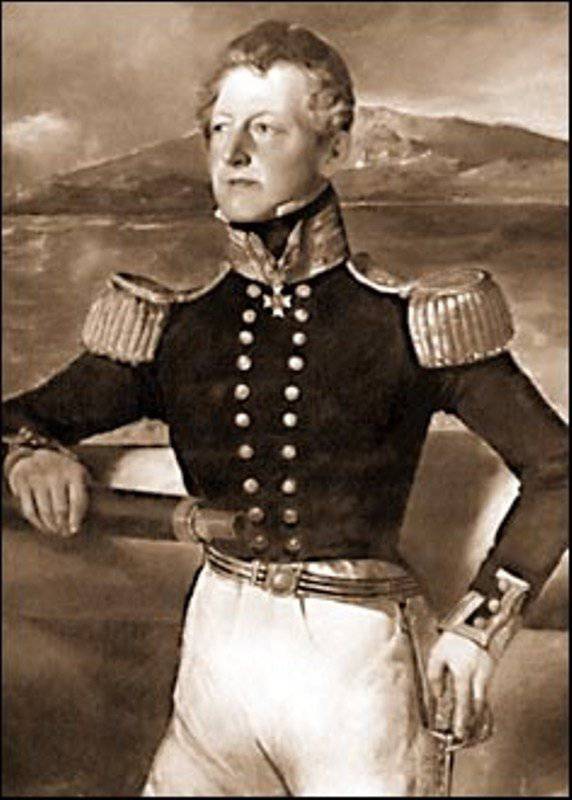
Rear Admiral David Powell Price (1790 - 31 August 1854)
The first assault on Petropavlovsk
After the death of Price, the high command was transferred to French Rear Admiral Febrier de Pointe. He did not change anything in the original disposition. After some delay in 19 (31) in August 1854, the allied fleet moved to Petropavlovsk and conducted reconnaissance by force. The ships began shelling two batteries (No. 1 and No. 2). The exchange of fire between ships and coastal batteries ended in the evening. The frigates and the steamer fired through the battery No. 1, Isthmus, Signalny and Nikolskaya Mountains, but did not succeed. The frigate "President" was damaged.
The night was restless. On the shore noted some kind of movement on enemy ships. Boats went from ship to ship, made measurements of the depths, the lights were burning. The garrison of Petropavlovsk prepared for battle and advanced several times to the guns.
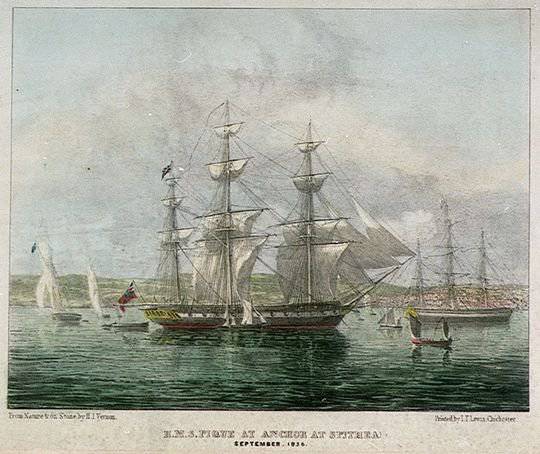
British frigate "Pike"
On the morning of August 20 (September 1) 1854, the Allied ships marched on a decisive assault on the Russian port. The British ships and the French frigate "Fort" fired at the batteries No. 1, 2 and 4, and at the Russian ships. The rest of the French ships bombarded the battery number 3, trying to divert the attention of the defenders of the port of Peter and Paul to themselves. At the same time, the frigate "Evridika" and the brig "Obligado" fired through fire, through Nikolskaya Hill hoping to get into the Aurora and Dvina.
Battery No. 1, located on Signal Cape and closest to the enemy, withstood the most brutal attack. The Governor Zavoyko was also on the “Signal” battery. The battle was hard - 8 guns of the “Signal” and “Cemetery” batteries were forced to duel with 80 guns of the left sides of three enemy frigates.
After a long battle, the main forces of the Allied squadron were able to crush the Russian batteries No. 1 and 4. Despite the heroic efforts of the cannon servants and examples of fearlessness that the commanders showed (for example, Lieutenant Gavrilov, wounded in the head and in the leg, did not leave the fighting position and continued to encourage people), the guns had to be left. The platforms were covered with earth above the wheels, the machines and hoists were broken. To turn the guns and respond with fire to the fire, in such a position it was impossible. Michman Popov, the commander of the battery number 4, riveted guns and left, taking ammunition. He connected with the 1 th rifle party of midshipman Mikhailov and took his people to the battery number 2.
The first task was implemented - the Allies shot down the “outer castle” of Petropavlovsk. However, they couldn’t destroy the “Kosh” battery (No. 2). The enemy was unable to inflict serious damage on the Aurora and Dvina. Flip fire of the French ships brought no success.
After that, the allies on rowing ships landed troops from 600 soldiers in the battery number 4. "Cat" battery tried to disrupt the landing, but without much success. The French raised their flag with enthusiastic clicks. However, almost immediately their mood was spoiled by the British. The French fell under the "friendly fire" - a bomb from an English steamer, hitting the very center of the battery, caused terrible confusion in the French squad. Then the frigate Aurora and the Dvina transport opened fire on the French.
By order of Zavoiko, all those who could have been thrown into the counterattack were sailors from the Aurora and volunteers of rifle detachments. The attack was led by midshipmen Fesun, Mikhailov, Popov and Lieutenant Gubarev. In total, the Russian detachment was about the company - 130 people. The Russians rushed to the bayonet attack, but the French paratroopers did not accept the battle, boarded the boats and fled to the ships. The whole battalion escaped without a fight. As noted midshipman Nikolai Fesun, who served on the Aurora frigate, the enemy retreated “at a run and with such speed that, before we arrived in the battery he occupied, he was already in the boats and out of shot, so that, despite the most ardent desire , this time it was not possible to try it even with rifle shots. ”
Meanwhile, the duel of the Koshechny Battery (No. 2) under the command of Lieutenant Prince Dmitry Petrovich Maksutov with three enemy frigates continued. The enemy, having on each side of his frigates two 2-pood bomb bombers, fired mainly from them. The enemy cores flew to the Russian battery and, hitting the fascines, did not cause any special harm. Russian 36-pound guns could only respond when the enemy was fascinated and came closer to fire a volley. Maksutov was an excellent commander, he waited in cold blood, did not get excited, did not spend his powder in vain, only fired when he was sure that the shots would not be wasted. Almost all the time while three enemy frigates fired, the Russian battery was silent and only from time to time aptly answered. This battle was an excellent example of the “cold rage” of Russian warriors: enemy frigates fired continuously (the enemy fired more 250 shots for half an hour), the cores plied the parapet in all directions, the bombs exploded in the air, from time to time they took the wounded and dead, and the Russians the gunners are cold and silent, quietly smoking pipes or joking fun. And here comes the ringing voice of the commander, the Russian guns are sending deadly gifts to the enemy, and again waiting.
The shooting stopped around 6 hours of the evening. The "cat" battery continued 9 hours to withstand more than 80 enemy guns. She resisted and the next day was ready for a new battle. On this first assault and ended. The Anglo-French squadron returned to its anchorage at the entrance to the bay.
The Russian warriors were preparing the next day to enter into a new battle. They believed that the enemy, having destroyed the advanced batteries, would undoubtedly continue the offensive. Zavoiko visited the Aurora and announced to the sailors that now they should expect a decisive attack of the enemy on the frigate, which was the most serious obstacle on the way to the port. The governor said that he hoped that the Russian sailors would stand up for themselves, to which he received a unanimous reply: “We will die, and not surrender!”
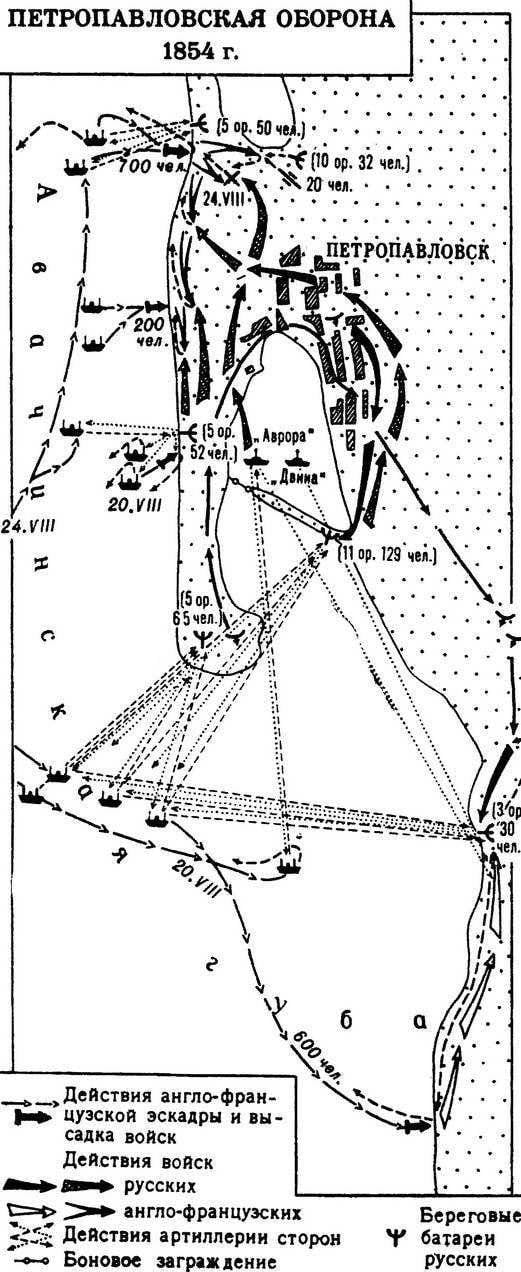
Second storm
Until August 24 (September 5), the Allies eliminated damage to ships and prepared for a new attack. They buried the dead on the island of Krasheninnikov. During the second assault, the main blow of the Allied squadron was aimed at batteries No. 3 (“Pereshtechnaya”) and No. 7 (at the northern end of the Nikolskaya hill). Here were the most powerful ships. Russian batteries fired at British ships - the frigate President, the steamboat Virago and the French frigate Fort. The frigates "Pike", "Eurydice" and the brig "Obligado" fought with batteries No. 1 and 4. On them all the guns were restored by the Russians weapons masters. The allies simulated the assault on August 20, showing that even today the main blow will be in this direction. Later, the frigates Pike and Eurydice joined the main forces.
The Anglo-French squadron, which had 118 guns on the main line, and then 194, was divided into two parts. One part of the squadron bombarded one Russian battery, the other - the second. In addition, the enemy had powerful bomb weapons. Both Russian batteries were armed with all 10 guns. After a three-hour battle, almost all Russian guns were damaged, and the servants from the batteries were forced to retreat.
Thus, the five guns of the "Perershechnyi" battery (No. 3) under the command of Lieutenant Prince Alexander Petrovich Maksutov fought a duel with the frigate "Fort." The volley of each side was equal to the 30 guns. As noted midshipman Fesun, the entire isthmus is completely dug, there was no arshina of the earth, where the core could not be found. In this case, the Russian battery at the beginning successfully answered: the French ship was seriously damaged. The ship was at a distance of no more than 4½ cables, and every nucleus that came across caused great damage. Soon the platforms of the guns were filled, the machines were broken, one gun was badly damaged, the other three could not act. Half of the servants were killed or injured. However, Maksutov himself suggested the last weapon and sank the big boat with the enemy troops. The French frigate, retalating for its own, responded with a whole board. The prince fell with a torn hand (Prince Maksutov died from a wound and inflammation of the lungs 10 September 1854 g.), And the last weapon was destroyed.
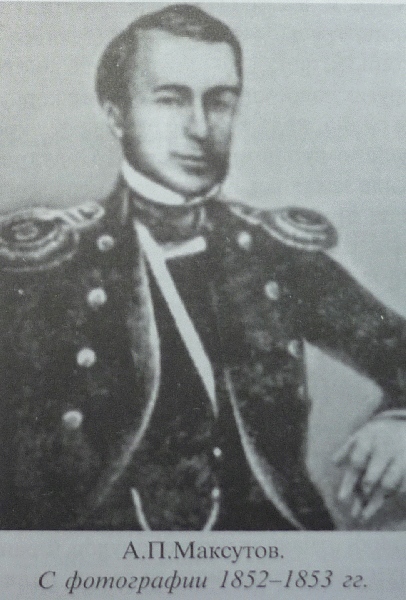
Alexander Petrovich Maksutov (1829 - 10 September 1854)
After the suppression of the Russian batteries, the Allied squadron landed two assault forces: near 250 a man on the isthmus of battery No. 3 (she received the name “Mortal” after this battle, as she was almost not covered by a parapet and there were significant losses on her) 700. A large part of the Allied assault force received the task of climbing the Nikolskaya hill and attacking and seizing the port of Petropavlovsk on the move. Another part of the troop unit, from the group that landed at the battery number 7, received an order to suppress the resistance of the battery number 7 (Ozernaya), to enter the country road and attack the city from the side of Kultushnoye Lake.
However, these plans failed. The “lake” battery, with the support of one 3-pound field gun, reversed the enemy assault forces with several caricature shots. Anglo-French landing retreated to Nikolskaya hill. About 1 thousand soldiers concentrated here. The enemy paratroopers, firing from the fittings, began to descend down to the city. Admiral Zavoyko collected all the reserves and took all of them from the batteries, threw people into a desperate counterattack. The Russian detachment (it consisted of several separate batches) was to attack up the slope. About 350 soldiers, sailors and citizens participated in the attack. And the Russian people once again performed a miracle. Russian bayonet attack turned the enemy to flight. Moreover, according to Fesun, the flight is “the most disorderly, and driven by some kind of special panic fear.”
It was incredible. Lieutenant Angudinov, Warrant Officer Mikhailov, Lieutenant Gubarev and other commanders did an unprecedented job: small groups of Russian soldiers on 30-40 fighters, rising to the heights under the fierce rifle fire of the enemy, showered with hand grenades, were able to overturn the British and French. Part of the enemy assault was driven back to the cliff, which went to the sea. Many Englishmen and Frenchmen crashed or crippled, jumping from a great height. An attempt to support the landing with ship fire failed. He was ineffective at that distance. The Russians occupied the heights and opened up gunfire, preventing any attempt to go on the counterattack. The remnants of the landing force were evacuated to the ships.
It must be said that, according to the recollections of the battle participants, the British and French showed the highest level of courage, taking out their dead and wounded. As Fesun wrote: “They will kill one - two are to take him; they will be killed - four more are; just incomprehensible. " The sight was terrible. The British and French under a hail of bullets stalked to the boats, carrying the wounded and dead on their shoulders. Allied landing craft sailed, taking away the piles of dead and wounded.
As a result, the second assault on Petropavlovsk ended in complete defeat of the Anglo-French forces. They could not use success in the first stage of the battle. More numerous, well-armed and occupying an excellent position allied troops suffered defeat from the Russian soldiers. The British and French could not resist the rage and determination of the Russian soldiers.
The Allies lost about 400 people killed, about 150 wounded and 5 prisoners. Russian soldiers captured the enemy banner and dozens of guns. The Russians lost 34 man in this battle.
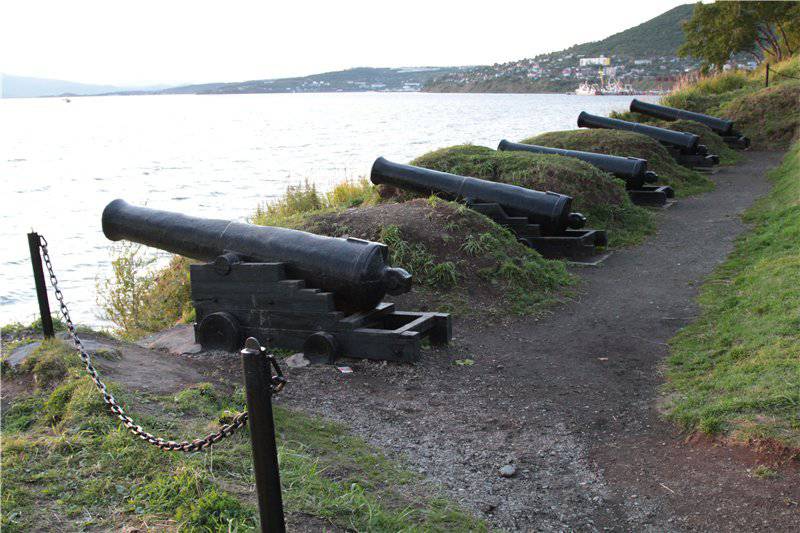
Layout of the Maksutov Death Battery
Results
The defense of Petropavlovsk ended in complete victory for the Russian forces. After a two-day lull, the Anglo-French ships sailed. Despite the successful defense of Petropavlovsk, it became clear to the high command that in wartime it would not be possible to reinforce and supply the port garrison with everything necessary. Therefore, it was decided to evacuate the port and the garrison from Kamchatka to Amur.
3 March 1855, the courier Esaul Martynov, breaking 8 thousand miles (8,5 thousand km) in an unusually short time - three months, brought the order to transfer the port. Port facilities and houses dismantled, the most valuable materials hid. Cossacks moved to the village, which stood at the mouth of the river Avacha. Soldiers and sailors sawed a passage for ships in the ice, and they left before the second enemy squadron approached. The port was transferred to Nikolaevsk-on-Amur. 8 (20) May 1855, the English-French expedition of five French and nine British ships entered Avacha Bay. But the place was uninhabitable, so the allies left.
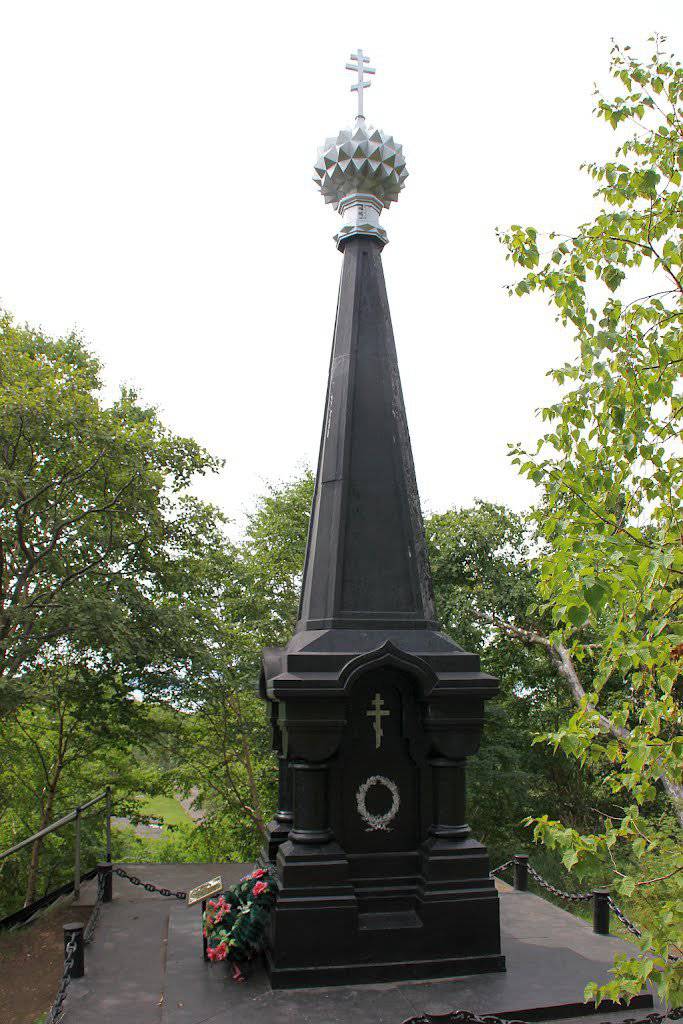
Monument of Glory to the heroes of the defense of Petropavlovsk from the attack of the Anglo-French squadron in August 1854.
Information